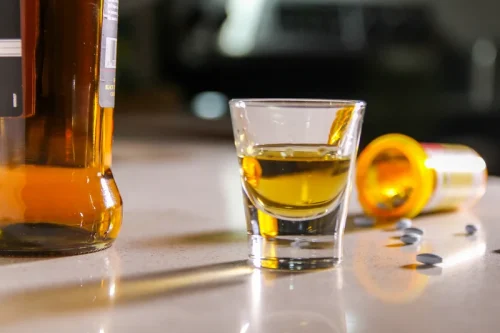
However, it is crucial to be mindful of your drinking habits and ensure they do not interfere with your daily life, work performance, or relationships. If you find yourself thinking about alcohol frequently or struggling to control your drinking, it may be time to re-evaluate your habits and consider seeking support. Whether you go for alcoholic or non-alcoholic beer—or water or milk or a sports drink—hydration is still key to exercise recovery.
Break Free From Alcohol Addiction — Get Help Today

According to a 2018 study (via Discover), alcohol is the third-leading cause of death in the United States. The World Health Organization (WHO) also states that “alcohol use is a risk factor for many cancer types including cancer of the oral cavity, pharynx, larynx, oesophagus, liver, colorectum and breast.” But there’s a little more to the story. It’s often a relief to knock back a drink or two after a long day at work, and as an added incentive, happy hour is usually from 4–6 p.m., coinciding perfectly with the end of the workday. After work drinks are the perfect excuse to celebrate the end of a successful project or the start of a big one. But sometimes, one drink leads to two or three, and before you know it, you’ve bought a couple rounds for the entire office. Even if you only end up having a cocktail or two, when you look at your bank statement at the end of the month, it’s the small expenses that add up to surprising figures.

Why is my heart rate weird after drinking?
Lauren Manaker, MS, RDN, LD, CLEC, CPT, a registered dietitian based in Charleston, also points out that although red wine has some compounds linked to positive health benefits, it’s still alcohol at the end of the day. “Alcohol is classified as a Group 1 beer after work carcinogen by the International Agency for Research on Cancer, which is the same classification as tobacco,” Manaker says. As such, red wine is grouped together with other liquors, such as vodka.
There are alternatives to drinking after work, such as sober team-building activities
Happy hour has also become a substitute for networking and brainstorming, with a third of the American workers surveyed saying that getting drinks after work promotes team bonding. Going out for drinks has become a routine for work-related celebration, whether it’s winning a new account or nailing a big presentation. With the rise of coworking spaces, regular beer on tap is advertised as a selling point. Some companies even designate a day of the week for an after-work happy hour. In many organizations, drinking at work is even encouraged, with some companies proudly promoting their Thursday afternoon beer cart perks for recruitment purposes.
- “For baking, mashed banana, applesauce, mashed avocado, puréed pumpkin, pureed sweet potato or silken tofu help bind the ingredients together and add moisture,” she says.
- “Alcohol is classified as a Group 1 carcinogen by the International Agency for Research on Cancer, which is the same classification as tobacco,” Manaker says.
- It is not inherently wrong to have a beer after work, but it depends on the context and your drinking patterns.
- The World Health Organization (WHO) also states that “alcohol use is a risk factor for many cancer types including cancer of the oral cavity, pharynx, larynx, oesophagus, liver, colorectum and breast.” But there’s a little more to the story.
- For example, nearly one in five lawyers struggle with heavy alcohol use.
Beer After Work: Side Effects And Health Risks
- While there can be peer pressure to drink from your coworkers, it’s important to remember that drinking is not required.
- Additionally, the high-calorie content of beer can contribute to weight gain, which can further impact overall nutritional intake and health.
- Creative hobbies, such as painting or playing music, not only provide a therapeutic outlet but also a sense of accomplishment.
- Medical professionals also warn against binge-drinking — that is, drinking five or more servings of alcohol on one occasion at least one day in the past 30 days.
- The accessibility of medications and the need for pain management contribute to this issue.
Drinking after work can contribute to exhaustion, brain fog, and lower productivity. Of course, it’s worth noting that the deleterious effects of alcohol are not a result of the occasional beverage. If you drink beer every night and it’s become part of your nightly routine as a way to kick back and relax after work, you might start to wonder how that’s impacting your health. According to WebMD, doctors caution against “at-risk” or “heavy” drinking, which means drinking more than three 12-ounce servings (about three cans) daily or seven 12-ounce servings over the course of a week for women. Medical professionals also warn against binge-drinking — that is, drinking five or more servings of alcohol on one occasion at least one day in the past 30 days.

In short, alcohol can act as a diuretic, which explains why you may need to pee frequently while tossing back some drinks. Additionally, booze contains ethanol which can increase gut movement, ultimately speeding up digestion without giving your gut a chance to absorb water, increasing the chances of experiencing diarrhea. No, it is not recommended to drink beer while taking sedatives or antibiotics.

Excessive alcohol consumption can cause a condition known as hypertension, characterised by increased blood pressure. Creative hobbies, such as painting or playing music, not only provide a therapeutic outlet but also a sense of accomplishment. Additionally, non-alcoholic beverages, including herbal teas and mocktails, offer a festive way to enjoy a drink without alcohol’s impact on health. With the rise of health consciousness, non-alcoholic beer and wine have also become popular as they provide the social aspect of drinking without the hangover. Engaging in regular after-work drinking can have significant mental health implications, such as the development of alcohol dependence and the exacerbation of depression and anxiety.
If you drink beer every night, you may live longer
For employees, of course, it is nice to be able to have another beer – often free of charge – at the bar, but as an employer there is no need to provide this, let alone an obligation to do so. Once you go over 4% alcohol content, or have more than one or two 12-ounce low ABV beers, that’s where the benefits decline, says Jaison Wynne, a PhD student at Old Dominion University and co-author of the review. Then you’re at risk of issues including higher water loss, reduced muscle gains, less than optimal training, and potentially an increase in body fat. According to Maeng, who is the founder of Chelsea Nutrition in New York City, it could be due to low blood sugar, which also contributes to your hangover. “Alcohol can prevent your body from maintaining a tight blood sugar control and cause low blood sugar level. Symptoms of low blood sugar are fatigue, headache and nausea,” Maeng said. Doctors, nurses, and other healthcare workers experience demanding and high-stress jobs, which can lead to substance abuse.
Psychological Influences Behind After-Work Drinking
- In Western societies, the institutionalization of regular alcohol consumption has been observed in various stages of life.
- Drinking after work is a way to de-stress and unwind with colleagues.
- “There are many other ways to obtain 12 grams of protein beyond eating two eggs, including plant-based and alternative protein sources,” Johnson says.
- However, consideration could be given to limiting the number of alcoholic drinks employees may enjoy at work, or to requiring employees to wait a certain amount of time before consuming alcohol after work.
- Beer, specifically, can provide hydration and may offer health benefits like reducing constipation, lowering cholesterol, and preventing osteoporosis.
- For example, heavy drinking is prevalent among miners, construction workers, and those in the hospitality and food service industries.
- With such a lax approach to alcohol during work hours, it isn’t surprising that alcohol after work has become so commonplace.
Beer can also worsen existing conditions such as gout, insomnia, and liver disease. Chronic alcohol use also has serious mental health implications, including the risk of developing alcohol use disorders (AUDs), depression and anxiety. Other long-term effects include an increased risk of certain cancers, pancreatitis, immune drug addiction system impairment and problems with concentration and memory. Excessive alcohol consumption can have negative effects on both physical and mental health.
